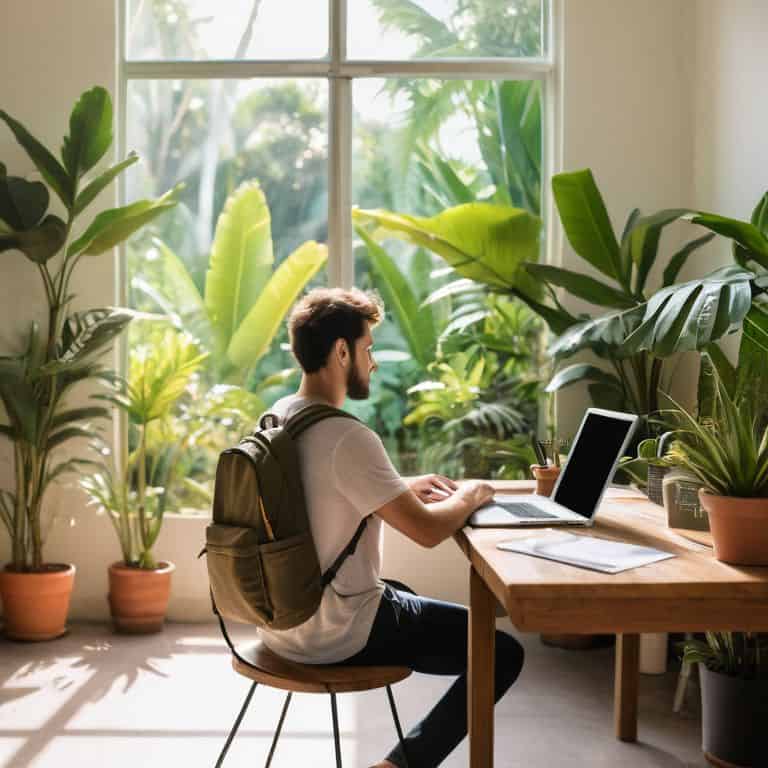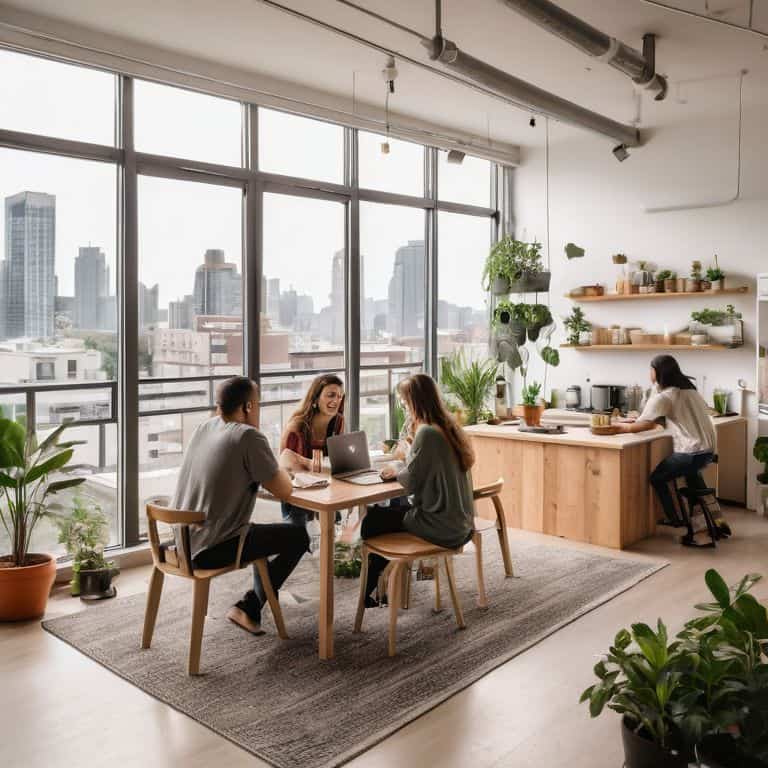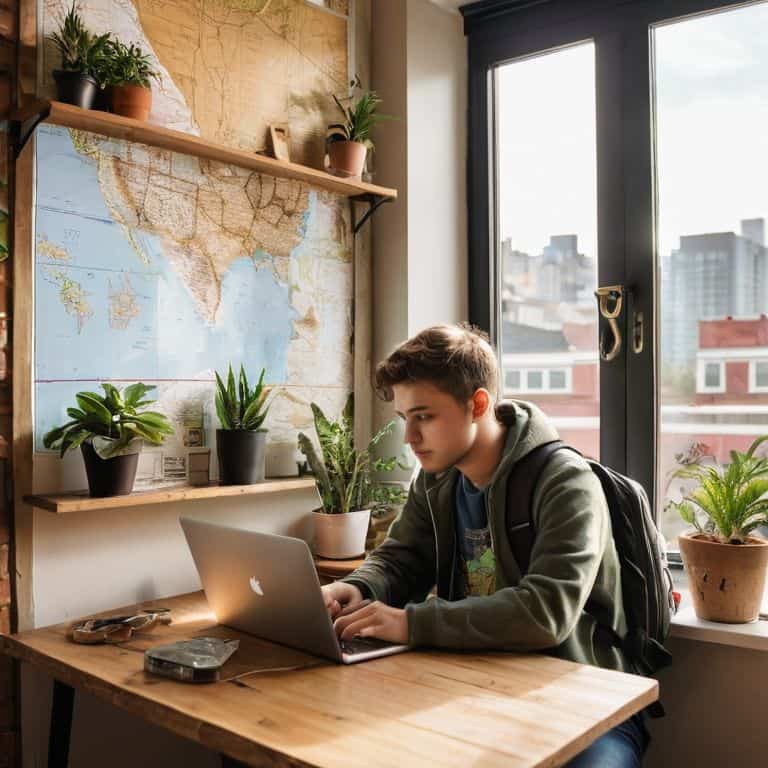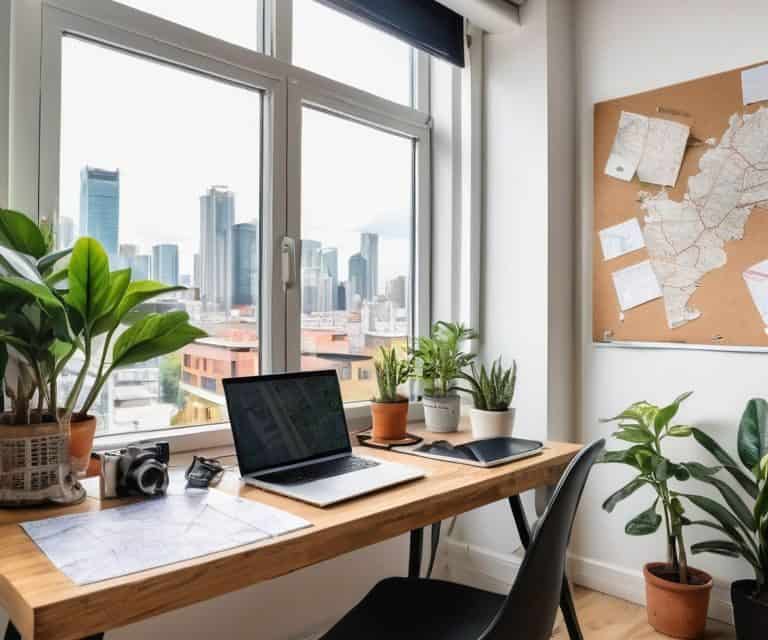I still remember the first time I tried finding accommodation for digital nomads – it was a nightmare. I had just arrived in a new city, eager to start my remote work adventure, and I thought I had done my research. But, as it often does, reality had other plans. The hostel I had booked was a dump, and the apartments I found online were either too expensive or too far from the city center. It was then that I realized the importance of having a solid strategy for finding accommodation that fits your budget and lifestyle.
In this article, I’ll share my hard-earned wisdom on how to find a home away from home as a digital nomad. I’ll cut through the noise and give you practical tips on how to avoid scams, find affordable accommodation, and make the most of your remote work experience. From negotiating with landlords to finding the best neighborhoods for digital nomads, I’ll cover it all. My goal is to help you navigate the often-complex world of accommodation hunting, so you can focus on what really matters – your work, your travels, and your well-being.
Table of Contents
- Guide Overview: What You'll Need
- Step-by-Step Instructions
- Finding Accommodation for Digital Nomads
- Ditching Hostels for Nomad Friendly Cities
- Navigating Affordable Coliving Spaces and Short Term Rentals
- Cutting Through the Chaos: My Top 5 Tips for Finding Accommodation as a Digital Nomad
- Key Takeaways for Digital Nomads
- The Reality of Nomadic Living
- Embracing the Digital Nomad Lifestyle
- Frequently Asked Questions
Guide Overview: What You'll Need

Total Time: 2 weeks – 3 months
Estimated Cost: $500 – $2,000
Difficulty Level: Intermediate
Tools Required
- Laptop with reliable internet connection
- Smartphone with accommodation finding apps
Supplies & Materials
- Travel documents passport, visa, etc.
- Budgeting spreadsheet to track expenses
- Research materials on destinations, cost of living, etc.
Step-by-Step Instructions
- 1. First, define your budget and stick to it – this will help you narrow down your options and avoid overspending on accommodation. As a digital nomad, it’s essential to prioritize your spending and make sure you’re not breaking the bank on a place to stay. I’ve learned this the hard way, having once splurged on a fancy Airbnb in Tokyo, only to realize I could’ve found a similar spot for half the price with a little more research.
- 2. Next, research, research, research – look into different neighborhoods, accommodation types, and prices to get a sense of what’s available in your desired location. I always start by reading blogs and forums, talking to other digital nomads, and scouring social media for insider tips. Don’t be afraid to reach out to people who have lived in the area and ask for their advice – it’s often the best way to get a local perspective.
- 3. Now it’s time to start looking for specific places to stay – I recommend using a combination of online platforms, such as Airbnb, Booking.com, and Facebook groups, to find the best options. Be sure to read reviews carefully and don’t be swayed by fancy photos or descriptions – look for feedback from previous guests and pay attention to any red flags. I once booked a place in Bali that looked amazing online, but turned out to be a total disaster – the owner was unresponsive, and the place was infested with bugs.
- 4. Once you’ve found a few potential places, it’s time to inspect them in person – if possible, try to visit the accommodation before committing to a booking. This will give you a chance to get a feel for the neighborhood, meet the owner or property manager, and make sure everything is as advertised. Don’t be afraid to ask questions or request additional photos or information – it’s better to be safe than sorry.
- 5. If you’re planning to stay in one place for an extended period, consider negotiating a long-term rental – many property owners are willing to offer discounts for longer stays, which can help you save money and settle into a routine. I’ve had success with this approach in the past, especially in smaller towns or cities where the rental market is less competitive. Just be sure to review your contract carefully and understand your obligations as a tenant.
- 6. As a digital nomad, it’s essential to have a reliable internet connection – research the accommodation’s internet speeds and reliability before booking, and consider asking the owner or property manager about any backup options in case the primary connection goes down. I’ve learned to always have a portable Wi-Fi hotspot as a backup, which has saved me from more than one internet emergency.
- 7. Finally, plan for the unexpected – as a digital nomad, you never know what might happen, from a natural disaster to a personal emergency. Make sure you have a emergency fund in place, and consider investing in travel insurance that covers unexpected events. I’ve had to deal with my fair share of unexpected challenges on the road, from a broken laptop to a sudden illness – but with the right planning and preparation, you can minimize the stress and stay focused on your work and travels.
Finding Accommodation for Digital Nomads

As a seasoned digital nomad, I’ve learned that nomad friendly cities are a game-changer when it comes to finding a place to call home. These cities offer a unique blend of affordability, community, and infrastructure that makes remote work a breeze. When searching for a spot to settle, I always look for affordable coliving spaces that offer a sense of community and camaraderie. Not only do these spaces provide a great way to connect with like-minded individuals, but they also often come with perks like shared workspaces and social events.
One of the biggest challenges I’ve faced as a digital nomad is navigating the global housing market trends. It seems like every city has its own unique quirks and nuances when it comes to renting, and it can be overwhelming to try and keep up. That’s why I always recommend doing your research and reaching out to local expat groups or online forums for advice. They can provide valuable insights and tips on everything from short term rental options to the best neighborhoods to consider.
When it comes to solo travel, I’ve found that solo travel accommodation tips are essential for staying safe and comfortable on the road. From choosing hotels with 24-hour reception to opting for remote work visa requirements that provide an added layer of security, there are plenty of ways to prioritize your well-being as a solo digital nomad. By taking the time to research and prepare, you can focus on what really matters: exploring new cities, meeting new people, and making the most of your digital nomad adventure.
Ditching Hostels for Nomad Friendly Cities
Ditching Hostels for Nomad Friendly Cities
I’ve been there, done that, and got the t-shirt – hostels can be a great way to meet fellow travelers, but they’re not always the most conducive to productivity or long-term stays. That’s why I love nomad-friendly cities like Chiang Mai or Medellín, where you can find affordable, fully-furnished apartments and a thriving community of remote workers. These cities offer a unique blend of culture, affordability, and digital infrastructure, making them perfect for digital nomads looking to settle in for a while.
From shared houses to private studios, the options are endless, and you can often find places that cater specifically to remote workers, with amenities like high-speed internet, co-working spaces, and even on-site gyms.
Navigating Affordable Coliving Spaces and Short Term Rentals
When it comes to coliving spaces and short-term rentals, I’ve learned to separate the wheat from the chaff. Look for places with a strong community vibe, reliable wifi, and a clear cancellation policy. I’ve had my fair share of horror stories, but platforms like Nomad List and Coliving.com have been total game-changers.
For short-term rentals, I swear by Airbnb and Booking.com – just make sure to read the reviews and check the location beforehand. Some of my favorite memories as a digital nomad have been in these types of setups, where you can really get to know your fellow travelers and locals alike.
Cutting Through the Chaos: My Top 5 Tips for Finding Accommodation as a Digital Nomad
- Research, Research, Research: Don’t Even Think About Booking Until You’ve Scoured the Internet for Reviews, Forums, and Social Media Groups to Get the Lowdown on a Place
- Know Your Budget (and Stick to It): Calculate Your Costs, Including Utilities, Internet, and Any Other Essentials, to Avoid Getting Burned by Hidden Fees or Overpriced Rentals
- Think Beyond the City Center: Consider Neighborhoods or Suburbs That Might Offer More Affordable Options, Better Quality of Life, or a More Local Experience
- Don’t Be Afraid to Negotiate: Whether You’re Dealing with a Landlord, Property Manager, or Coliving Space, Remember That Prices Are Often Flexible, Especially for Longer-Term Stays
- Trust Your Instincts: If a Place Feels Off or You Get a Bad Vibe from the Owner/Manager, Don’t Hesitate to Keep Looking – Your Sanity and Safety Are Worth More Than Any Discount or Perk
Key Takeaways for Digital Nomads
Research and planning are crucial to finding the right accommodation, and it’s essential to consider factors like safety, affordability, and community when choosing a place to call home
Coliving spaces and short-term rentals can be great alternatives to hostels, offering a sense of community and flexibility, but it’s vital to read reviews, ask questions, and inspect the property before committing
By being open-minded, flexible, and willing to take calculated risks, digital nomads can find amazing accommodation options that fit their lifestyle and budget, and make the most of their remote work experience
The Reality of Nomadic Living
Finding accommodation as a digital nomad isn’t just about scoring a cheap room, it’s about crafting a life that’s rooted in freedom, flexibility, and a willingness to take the road less traveled – even when that road leads to a dodgy Wi-Fi connection and a 3 am rooster concert.
Clara Bishop
Embracing the Digital Nomad Lifestyle

As I wrap up this guide on finding accommodation for digital nomads, I want to emphasize that ditching the hostel and opting for a more local experience can be a game-changer. From navigating affordable coliving spaces to finding short-term rentals, it’s all about being flexible and open to new experiences. Remember, the key to making this lifestyle work is to be proactive and plan ahead, but also to leave some room for spontaneity and exploration. Whether you’re a seasoned nomad or just starting out, I hope these tips have been helpful in your search for the perfect spot to call home
So, as you embark on your own digital nomad journey, I want to leave you with a final thought: the world is your playground. Don’t be afraid to take risks, try new things, and get a little lost. With the right mindset and a bit of planning, you can create a life that’s truly unconventional and fulfilling. Happy travels, and I’ll catch you on the road!
Frequently Asked Questions
What are the most important factors to consider when choosing a neighborhood to live in as a digital nomad?
When choosing a neighborhood, I consider safety, Wi-Fi reliability, and proximity to cafes, coworking spaces, and street food hubs. Also, think about the vibe: do you want lively and social or chill and quiet? Your neighborhood will be your base, so pick one that fits your lifestyle and work needs.
How can I avoid getting scammed when renting a short-term apartment or house in a foreign country?
Been there, done that! To avoid scams, research the area, read reviews, and never wire money without seeing the place. Use reputable platforms like Airbnb or Booking, and always meet the landlord or agent in person. Trust your instincts, and don’t be afraid to walk away if something feels off.
What are some red flags to watch out for when selecting a coliving space or shared accommodation as a digital nomad?
Red flags to watch out for? Be wary of sketchy contracts, weirdly high deposits, or landlords who seem super evasive about the space. Also, if the photos look too good to be true or the price is ridiculously low, trust your instincts – it’s probably a scam. Always read reviews from multiple sources and ask to see the space before committing.
